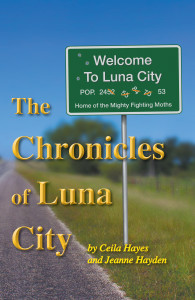The final cover for The Chronicles of Luna City!
And a bonus: a brief chapter regarding Day of the Dead in Luna City
Day of the Dead
The dead are always with us – their memories, if not their actual presence. Some of the residents of Luna City do claim a casual speaking relationship with the dead, through some medium or other. Judy Grant claims to see auras and to sense otherworldly presences. The rest, especially those over a certain age – are acquainted with the dead. The oldest residents; Miss Letty McAllister, Dr. Wyler, Adeliza Gonzales, all of whom have passed into their eighth decade at the very least, are now in the curious position of having more friends among the dead than they do the living.
Such is the custom in the borderlands, which includes Luna City; there is a time to formally acknowledge those gone on before. In the Catholic Church, the first and second days of November — All Saint’s and All Soul’s Days – are set aside to honor and celebrate saints and martyrs, and then to remember all the others. Such orthodox Catholic rites and traditions of observing All Saints and All Souls merged, or were grafted onto more ancient customs. In Mexico, such observances merged with a traditional festival honoring an Aztec goddess of the underworld. It is believed that over the Days of the Dead, they are allowed to return for a visit to the living. It is considered a fond and courteous gesture to put out refreshments for those visitors, especially the deceased’s favorite food and drink. In Mexico and in the southern borderlands, the dead are honored with representations of skulls, and offerings of marigolds and special food and drink. Families visit the graveyard, and adorn the grave of a loved one with flowers, or build special private altars adorned with pictures of the deceased, with flowers, candles and significant memorabilia. It’s just one of those things.
The most visible Day of the Dead observance in Luna City appears stealthily around the War Memorial on Town Square – a grey granite obelisk on a four-square base, upon which are carved names of local men from both world wars, Korea, and Vietnam, and a single freshly-incised name of a Marine, L.Cpl. J.W. Ellis, dead in the aftermath of an ambush near Fallujah in 2004. There is also the name of a single woman; an Army nurse who perished at Anzio in the Second World War. She was a girlhood friend of Miss Letty’s – who brings and leaves for three days a bright red lipstick and a tiny vial of Coty Emeraude. Bottles of beer also appear, almost by magic – Pabst, Shiner, Lone Star and Pearl. On his way out to the Wyler ranch to participate in Doc Wyler’s hunting trip (the first days of hunting season coincide with Day of the Dead – a coincidence which some have found bitterly ironic) Chris Mayall brings a half-dozen cellophane-wrapped Moon Pies for J.W. Ellis. Those were J.W.’s favorite, and he always shared them out with his buddies in the company when they got care packages from home.
In the little office in the Abernathy building, Jess brings out the silver-framed picture of her mother Beth, luminous in a bridal gown and veil. She waits until after Martin and her grandfather have gone to the Wyler ranch, wondering if Martin still grieves for her mother … if he does or doesn’t, Jess doesn’t want him to think that she is reproaching him. Martin has been the best and most devoted Dad ever. Perhaps he has finally dealt with the death of his wife, since it has been twenty years and a bit. Jess was ten when Beth died; if she has come to grips with her loss, she is not certain she wants to know for certain if Martin has. She sets up a modestly-Anglo version of a Day of the Dead altar; some yellow and white silk irises in a glass jar and a small Franciscan Desert Rose-patterned plate with some home-made raison oatmeal cookies on them. Yellow was Beth Abernathy’s favorite color … and she always made raisin oatmeal cookies for Jess. The smell of oatmeal cookies baking – butter, brown sugar, cinnamon brings the memory of her mother most piercingly back to Jess: but not as she last saw her mom, skeletal and shrunken, stuck full of needles and plastic tubes in a hospital room in a big hospital in San Antonio. Jess’ fondest memory is of her mother mopping the floor of the Abernathy’s little house three blocks from Town square, her hair tied up in a scarf, and scolding Jess affectionately for tracking across the clean floor with dirt on her shoes, while the smell of baking cookies perfumed the air.
Miss Letty, sternly Methodist and with no inclination to follow any custom or practice which smacks of either high church or pagan practices does, nonetheless, put out a dusty bottle of aged Courvoisier on the mantle of the old-fashioned parlor, where a tinted sepia portrait of her grandfather, Arthur McAllister sits beside a smaller one of her brother, Douglas … the professor of history at the notable university in San Antonio. Douglas was three years older than Miss Letty, and she recalls him quite fondly – although with some disapproval over what she viewed as his inappropriate sense of humor.
Joe Vaughn and the half-dozen officers of the Luna City Police Department do set up regular memorial alter in the little foyer of the police department building, at the edge of town. It honors those officers of notable memory who served Luna City over the years, a few with some distinction, but most with quiet day-to-day devotion to their fellow citizens, their town, their community. Joe brings in a large box of dounuts from the Krispy-Kreme in Karnesville. There is one picture not of a police officer among them; Hernando ‘Nando’ Gonzalez, who was a jet fighter ace in the Korean War. His taste for speed and dangerous living unappeased by the end of that war, Nando worked as a stunt pilot in Hollywood for several decades afterwards. Being barely tall enough to qualify as a military pilot back in the day, and as lightly-built as a jockey, he also performed (disguised with suitable padding, costume and wigs) as a stunt double for a number of different actresses and child actors. In retirement, crippled by arthritis, age and the inevitable accidents attendant on that kind of life, he returned to Luna City, and lived in contented retirement in a comfortable residence just down Rte 123 from Miss Letty. He was in the habit of driving into town every day at 11:00 AM sharp for lunch at the Café … at the wheel of a massive boat-like late 60’s Cadillac … which in the beginning was in pristine condition. Alas, as the trials of old-age shrank Nando even farther, he could barely see, or be seen over the dashboard of the Caddy. In fact, the Caddy usually appeared to be driving itself, with a pair of tiny gnarled hands and the top of Nando’s jaunty tweed flat cap just visible over the steering wheel. The Caddy suffered from a number of glancing collisions with the curb, telephone poles, fire hydrants, trash cans, the massive oak tree in the middle of Oak Street and West Town Square, the ornamental bollards in front of the Café itself and numerous other motorists. Damage was never extensive, mostly as Nando usually wasn’t traveling much faster than fifteen miles an hour. Still – Nando and his Caddy posed a hazard, especially to pedestrians. Nando could not be made to stop driving; someone who in his time had faced Chinese MIGs over the Yalu River was disinclined to follow the orders of a police officer who most likely was one of his nephews anyway. Lunaites had no real stomach for revoking his driver’s license, either. Chief Vaughn’s predecessor devised an interim solution at last. When alerted by a phone call from Miss Letty upon observing Nando’s Caddy rolling menacingly past her house, the duty officer, or the chief himself would set the ancient air raid siren to roar briefly into life – alerting everyone along Nando’s favored route to get the hell out of his way. Nando, quite deaf by that time, was happily unaware of the daily siren alert.
This is why the air raid siren at the Luna City Police station sounds at 11:00 AM on the 1st of November every year. In case you were wondering.



Recent Comments